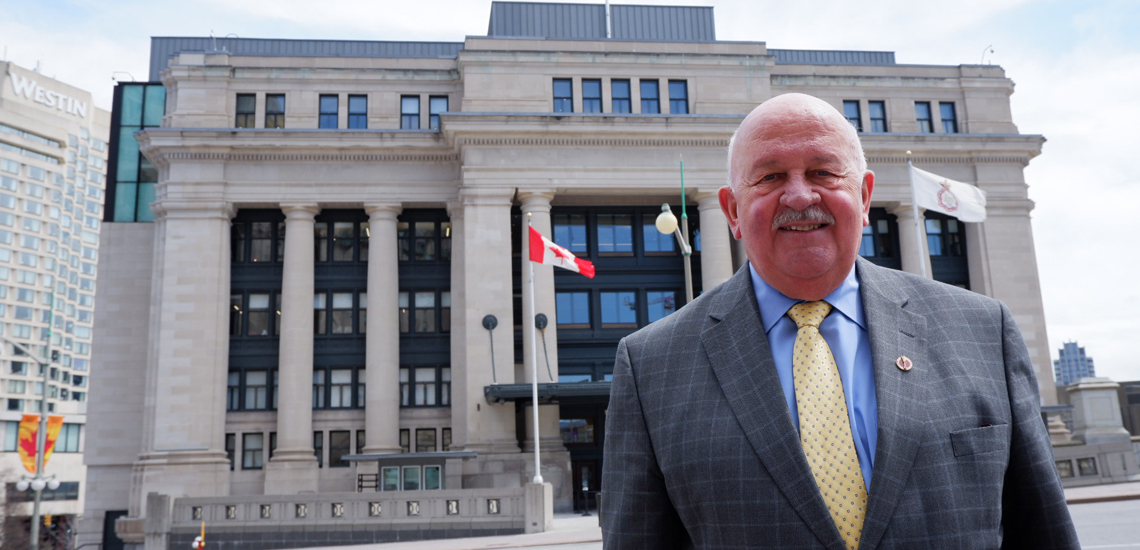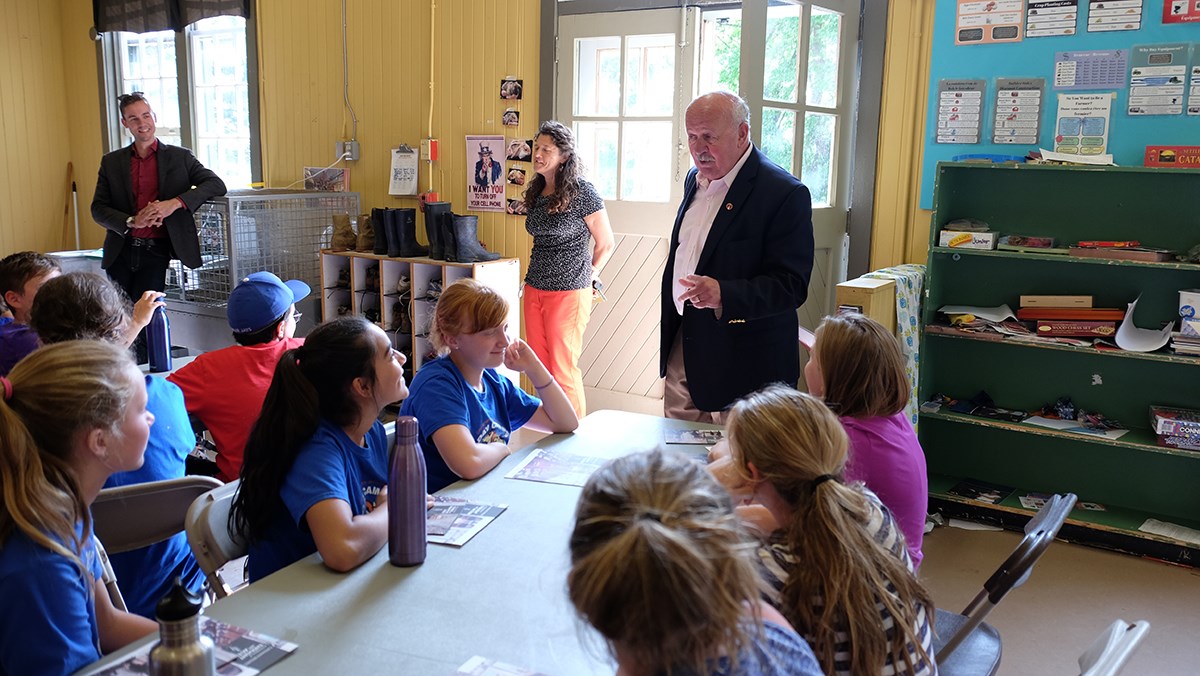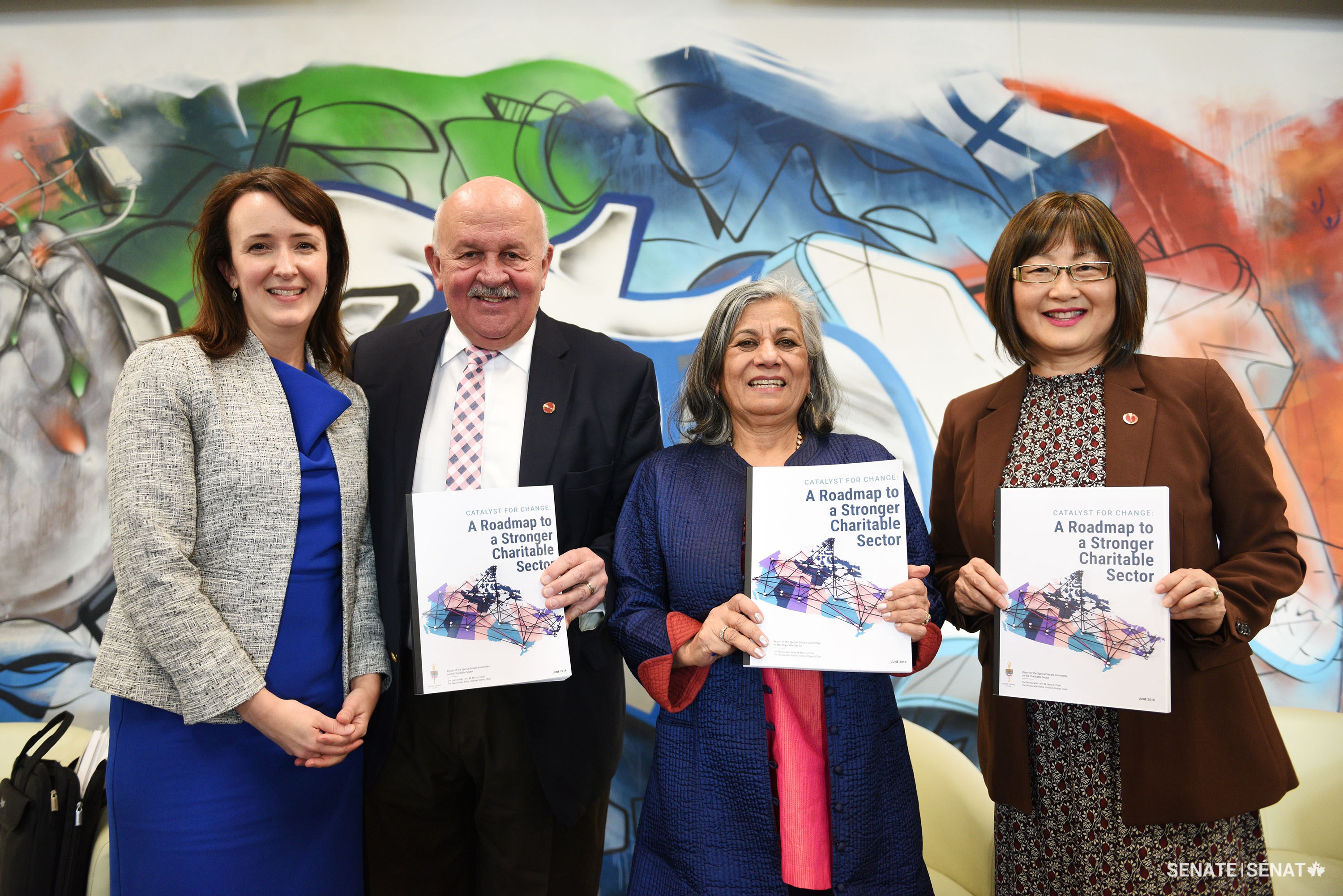‘Don’t forget where you come from’: Senator Mercer retires

Senator Terry M. Mercer grew up blocks away from the naval base in Halifax, Nova Scotia, in a low-income neighbourhood that was home to many sailors. He credits his hometown for paving his way to the Senate.
It was in Nova Scotia where he started his long career working for charitable organizations, including the Kidney Foundation of Canada (Nova Scotia Branch) and the Nova Scotia Lung Association. He then moved to the YMCA of Greater Toronto and eventually landed at the Liberal Party of Canada as a national director. He came to know then-prime minister Jean Chrétien, who appointed Senator Mercer to the Red Chamber as a Nova Scotia representative in 2003.
Before retiring on May 6, 2022, Senator Mercer reflected on his 19-year tenure in the Senate.
You have served on many Senate committees, but none as consistently as the Agriculture and Forestry committee. How did a self-declared “city boy” develop a knack for agriculture policy?
I found myself on the agriculture committee because that was the spot that was available when I was appointed. I was told that I was going to be a temporary member. Temporary in the Senate means 19 years, I guess!
I knew very little about the subject matter, but I realized I had two things in my favour to be on this committee: I’m the principal grocery shopper in my family and I’m also the principal cook. I purchase and use agricultural products so that my family hopefully enjoys my cooking. Or at least if they don’t, then I do! So that’s how I started to look at agriculture policy.
I paid attention to people like the late senators Leonard Gustafson and Joyce Fairbairn and other senators who had been on the committee for some time. I never tried to overstep because others had deeper knowledge. I have a great deal of respect for people who are in the industry.
What are your biggest takeaways about Canada’s agriculture sector?
We need to accept that we have a labour shortage in the sector and we need to make sure that the Temporary Foreign Worker Program is well managed, that foreign workers are fairly treated and that farmers also benefit. I’ve visited farms all across the country where the acceptance of temporary foreign workers varies, but I tell you, it doesn’t vary with me. I value their contribution to our industry, as all Canadians should. Canadians need to understand that we wouldn’t be producing the same products without foreign workers.
Your office is filled with photos of former prime minister Jean Chrétien! What has his legacy meant to you?
There’s a joke in my office that you can count all my pictures of Jean Chrétien and you’ll never get the right answer. Underneath my desk is a bag of campaign buttons with Jean Chrétien’s picture on them; dozens and dozens, I have no idea how many are in the bag. I keep them under my desk just in case he decides to come back. I think that his contribution to Canadian public life will be remembered for a long time and in a very positive light. He’s a terrific man.

Senator Terry M. Mercer meets with participants in the Canada Agriculture and Food Museum’s Junior Farmer Camp in Ottawa in September 2017 as part of his work with the Senate Committee on Agriculture and Forestry.

Senator Mercer stands with members of the Royal Canadian Navy and Canadian Coast Guard for Navy and Coast Guard Appreciation Day in the Senate in 2018.

Senator Mercer meets with participants of the Forum for Young Canadians in March 2018.

Senators Terry M. Mercer, Ratna Omidvar and Yonah Martin participate in a panel discussion with members of the Association of Fundraising Professionals Ottawa chapter to highlight key findings and recommendations from the Special Senate Committee on the Charitable Sector report, Catalyst for Change: A Roadmap to a Stronger Charitable Sector in December 2019.
You introduced the National Philanthropy Day Act, which made Canada the first country to recognize November 15 as National Philanthropy Day. As a long-time advocate of charitable organizations, what did it mean to you to achieve this?
I finally convinced my colleagues how important this sector is, in terms of the work and the number of jobs it generates. I think Canadians need to recognize the role that volunteers and volunteer organizations play in their daily lives. National Philanthropy Day is a recognition of both the donors and the recipients.
What drew you to charity work in the first place?
The people of Nova Scotia helped me make that decision. Between 1974 and 1978, I was the executive assistant to the minister of labour and housing in Nova Scotia. When the Liberals were defeated in the election, I was looking around for something to do and a friend of mine called to say the Kidney Foundation was looking for someone to become its first executive director. I didn’t know anything about the Kidney Foundation, but I wanted to make sure that I left a lasting legacy. I’m very proud of the structure that we put in place for the organization. From then on, I was committed to the charity sector.
Halifax is home to Canada’s largest military base, CFB Halifax, and your father served in the Royal Canadian Navy during the Second World War. How has this informed your appreciation for the Navy and involvement in Navy Day in the Senate?
The fact that I grew up blocks from the HMC Dockyard had some influence. I grew up in a neighbourhood where some of my neighbours or their families were sailors.
One of the things my father understood was how difficult it is to be sailor in any country, but particularly in Canada. I think he appreciated it before joining the Navy in 1939, but he certainly appreciated it even more after serving. His discipline and understanding of the Navy played a very major role.
When I had an opportunity to help co-sponsor Navy Day on the Hill, I jumped at the chance. It should be noted that a group of volunteer Senate staff started the event. We had no money. We had no budget. All we knew was we wanted to have a day to celebrate the Royal Canadian Navy. Some of my staff went out to a local brew pub and brewed the beer for this party. They also made the wine. The party was such a huge success that we never had to go back to making our own because sponsors were much easier to find. Navy and Coast Guard Appreciation Day became one of the premiere social events on the Hill. It gave us an opportunity to celebrate the contributions of the men and women in the Navy and Coast Guard.
What surprised you about the Senate?
The Senate had a bad rap for being full of old farts like me. Now I’ve always worked very hard — I’m a type A person — but I was surprised at how hard everybody had to work at the Senate. I was also surprised at the quality of the staff who supported us.
Do you have any words of wisdom for future Nova Scotia senators?
Pay attention to what’s going on locally. Listen, listen, listen. Don’t shy away from being involved in local projects. Volunteer. I continue to volunteer and that keeps me grounded.
One of the most important things any senator needs to remember is don’t forget where you come from. If you look at my title, it’s Senator Terry M. Mercer, Northend Halifax. I grew up in a poor part of town and it’s important for me to remember where I come from. It’s important for every senator to remember the people who help them get to the Senate. My family has been extremely supportive, particularly my wife Ellen. We recently celebrated our 50th wedding anniversary.
Do you have any post-retirement plans?
I want to start a vegetable garden and spend more time travelling with my wife. We’ve been very fortunate to have travelled extensively in my job over the years, but there are a few more places we’d like to see.
Related articles
Tags
Committee news
‘Don’t forget where you come from’: Senator Mercer retires

Senator Terry M. Mercer grew up blocks away from the naval base in Halifax, Nova Scotia, in a low-income neighbourhood that was home to many sailors. He credits his hometown for paving his way to the Senate.
It was in Nova Scotia where he started his long career working for charitable organizations, including the Kidney Foundation of Canada (Nova Scotia Branch) and the Nova Scotia Lung Association. He then moved to the YMCA of Greater Toronto and eventually landed at the Liberal Party of Canada as a national director. He came to know then-prime minister Jean Chrétien, who appointed Senator Mercer to the Red Chamber as a Nova Scotia representative in 2003.
Before retiring on May 6, 2022, Senator Mercer reflected on his 19-year tenure in the Senate.
You have served on many Senate committees, but none as consistently as the Agriculture and Forestry committee. How did a self-declared “city boy” develop a knack for agriculture policy?
I found myself on the agriculture committee because that was the spot that was available when I was appointed. I was told that I was going to be a temporary member. Temporary in the Senate means 19 years, I guess!
I knew very little about the subject matter, but I realized I had two things in my favour to be on this committee: I’m the principal grocery shopper in my family and I’m also the principal cook. I purchase and use agricultural products so that my family hopefully enjoys my cooking. Or at least if they don’t, then I do! So that’s how I started to look at agriculture policy.
I paid attention to people like the late senators Leonard Gustafson and Joyce Fairbairn and other senators who had been on the committee for some time. I never tried to overstep because others had deeper knowledge. I have a great deal of respect for people who are in the industry.
What are your biggest takeaways about Canada’s agriculture sector?
We need to accept that we have a labour shortage in the sector and we need to make sure that the Temporary Foreign Worker Program is well managed, that foreign workers are fairly treated and that farmers also benefit. I’ve visited farms all across the country where the acceptance of temporary foreign workers varies, but I tell you, it doesn’t vary with me. I value their contribution to our industry, as all Canadians should. Canadians need to understand that we wouldn’t be producing the same products without foreign workers.
Your office is filled with photos of former prime minister Jean Chrétien! What has his legacy meant to you?
There’s a joke in my office that you can count all my pictures of Jean Chrétien and you’ll never get the right answer. Underneath my desk is a bag of campaign buttons with Jean Chrétien’s picture on them; dozens and dozens, I have no idea how many are in the bag. I keep them under my desk just in case he decides to come back. I think that his contribution to Canadian public life will be remembered for a long time and in a very positive light. He’s a terrific man.

Senator Terry M. Mercer meets with participants in the Canada Agriculture and Food Museum’s Junior Farmer Camp in Ottawa in September 2017 as part of his work with the Senate Committee on Agriculture and Forestry.

Senator Mercer stands with members of the Royal Canadian Navy and Canadian Coast Guard for Navy and Coast Guard Appreciation Day in the Senate in 2018.

Senator Mercer meets with participants of the Forum for Young Canadians in March 2018.

Senators Terry M. Mercer, Ratna Omidvar and Yonah Martin participate in a panel discussion with members of the Association of Fundraising Professionals Ottawa chapter to highlight key findings and recommendations from the Special Senate Committee on the Charitable Sector report, Catalyst for Change: A Roadmap to a Stronger Charitable Sector in December 2019.
You introduced the National Philanthropy Day Act, which made Canada the first country to recognize November 15 as National Philanthropy Day. As a long-time advocate of charitable organizations, what did it mean to you to achieve this?
I finally convinced my colleagues how important this sector is, in terms of the work and the number of jobs it generates. I think Canadians need to recognize the role that volunteers and volunteer organizations play in their daily lives. National Philanthropy Day is a recognition of both the donors and the recipients.
What drew you to charity work in the first place?
The people of Nova Scotia helped me make that decision. Between 1974 and 1978, I was the executive assistant to the minister of labour and housing in Nova Scotia. When the Liberals were defeated in the election, I was looking around for something to do and a friend of mine called to say the Kidney Foundation was looking for someone to become its first executive director. I didn’t know anything about the Kidney Foundation, but I wanted to make sure that I left a lasting legacy. I’m very proud of the structure that we put in place for the organization. From then on, I was committed to the charity sector.
Halifax is home to Canada’s largest military base, CFB Halifax, and your father served in the Royal Canadian Navy during the Second World War. How has this informed your appreciation for the Navy and involvement in Navy Day in the Senate?
The fact that I grew up blocks from the HMC Dockyard had some influence. I grew up in a neighbourhood where some of my neighbours or their families were sailors.
One of the things my father understood was how difficult it is to be sailor in any country, but particularly in Canada. I think he appreciated it before joining the Navy in 1939, but he certainly appreciated it even more after serving. His discipline and understanding of the Navy played a very major role.
When I had an opportunity to help co-sponsor Navy Day on the Hill, I jumped at the chance. It should be noted that a group of volunteer Senate staff started the event. We had no money. We had no budget. All we knew was we wanted to have a day to celebrate the Royal Canadian Navy. Some of my staff went out to a local brew pub and brewed the beer for this party. They also made the wine. The party was such a huge success that we never had to go back to making our own because sponsors were much easier to find. Navy and Coast Guard Appreciation Day became one of the premiere social events on the Hill. It gave us an opportunity to celebrate the contributions of the men and women in the Navy and Coast Guard.
What surprised you about the Senate?
The Senate had a bad rap for being full of old farts like me. Now I’ve always worked very hard — I’m a type A person — but I was surprised at how hard everybody had to work at the Senate. I was also surprised at the quality of the staff who supported us.
Do you have any words of wisdom for future Nova Scotia senators?
Pay attention to what’s going on locally. Listen, listen, listen. Don’t shy away from being involved in local projects. Volunteer. I continue to volunteer and that keeps me grounded.
One of the most important things any senator needs to remember is don’t forget where you come from. If you look at my title, it’s Senator Terry M. Mercer, Northend Halifax. I grew up in a poor part of town and it’s important for me to remember where I come from. It’s important for every senator to remember the people who help them get to the Senate. My family has been extremely supportive, particularly my wife Ellen. We recently celebrated our 50th wedding anniversary.
Do you have any post-retirement plans?
I want to start a vegetable garden and spend more time travelling with my wife. We’ve been very fortunate to have travelled extensively in my job over the years, but there are a few more places we’d like to see.


